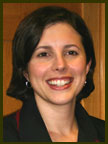Responding to Client Therapy-Interfering Behaviors with Jennifer Kirby, PhD
Responding to Client Therapy-Interfering Behaviors Using Behavioral Principles and Techniques
 Developing an understanding of clients’ problematic behaviors, particularly those that potentially interfere or limit the effectiveness of psychotherapy, is important in creating sound treatment approaches that both assist clients in making gains and therapists in maintaining treatment morale. Drawing from dialectical behavior therapy and behavioral analysis, this workshop will present an approach to assessing and intervening on those client behaviors (therapy-interfering behaviors) that can limit therapeutic progress and greatly frustrate therapists, potentially leading to therapist burn-out over time. This workshop will provide a brief introduction to behavioral principles, a discussion of the treatment strategies of behavioral analysis and solution analysis, and a consideration of how these interventions can be employed with the ultimate goal of enhancing the therapeutic alliance and overall treatment process.
Developing an understanding of clients’ problematic behaviors, particularly those that potentially interfere or limit the effectiveness of psychotherapy, is important in creating sound treatment approaches that both assist clients in making gains and therapists in maintaining treatment morale. Drawing from dialectical behavior therapy and behavioral analysis, this workshop will present an approach to assessing and intervening on those client behaviors (therapy-interfering behaviors) that can limit therapeutic progress and greatly frustrate therapists, potentially leading to therapist burn-out over time. This workshop will provide a brief introduction to behavioral principles, a discussion of the treatment strategies of behavioral analysis and solution analysis, and a consideration of how these interventions can be employed with the ultimate goal of enhancing the therapeutic alliance and overall treatment process.
Jennifer S. Kirby, PhD is a Licensed Psychologist and Research Assistant Professor in the Departments of Psychology and Psychiatry at the University of North Carolina at Chapel Hill. She specializes in cognitive behavioral therapy and dialectical behavior therapy, and trains and supervises graduate students in individual and couple therapy using these treatment approaches. Dr. Kirby has participated in the development and evaluation of a number of relationship intervention programs from a cognitive-behavioral perspective. These have included working with couples who are experiencing emotion dysregulation, health concerns such as breast cancer, extramarital affairs, anorexia nervosa, and couples who are preparing for marriage. Her interest and expertise in training others in individual and couple therapy is enriched by her teaching of doctoral courses in dialectical behavior therapy, empirically supported treatments for adults, and clinical supervision. She also maintains an active private practice with individuals and couples.